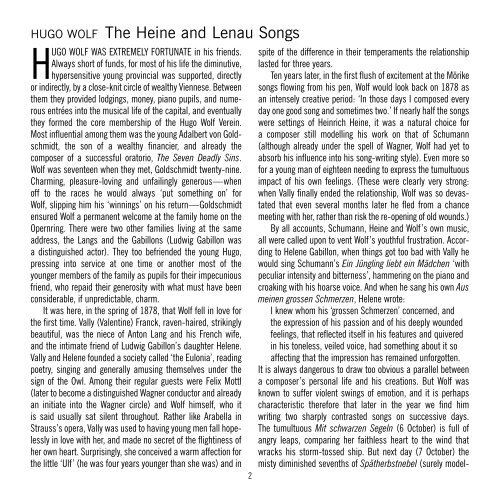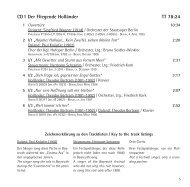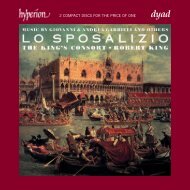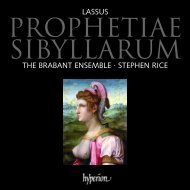Wolf: Lieder nach Heine und Lenau - Abeille Musique
Wolf: Lieder nach Heine und Lenau - Abeille Musique
Wolf: Lieder nach Heine und Lenau - Abeille Musique
Sie wollen auch ein ePaper? Erhöhen Sie die Reichweite Ihrer Titel.
YUMPU macht aus Druck-PDFs automatisch weboptimierte ePaper, die Google liebt.
HUGO WOLF The <strong>Heine</strong> and <strong>Lenau</strong> Songs<br />
H<br />
UGO WOLF WAS EXTREMELY FORTUNATE in his friends.<br />
Always short of f<strong>und</strong>s, for most of his life the diminutive,<br />
hypersensitive young provincial was supported, directly<br />
or indirectly, by a close-knit circle of wealthy Viennese. Between<br />
them they provided lodgings, money, piano pupils, and nume -<br />
rous entrées into the musical life of the capital, and eventually<br />
they formed the core membership of the Hugo <strong>Wolf</strong> Verein.<br />
Most influential among them was the young Adalbert von Gold -<br />
schmidt, the son of a wealthy financier, and already the<br />
composer of a successful oratorio, The Seven Deadly Sins.<br />
<strong>Wolf</strong> was seventeen when they met, Goldschmidt twenty-nine.<br />
Charming, pleasure-loving and unfailingly generous—when<br />
off to the races he would always ‘put something on’ for<br />
<strong>Wolf</strong>, slipping him his ‘winnings’ on his return—Goldschmidt<br />
ensured <strong>Wolf</strong> a permanent welcome at the family home on the<br />
Opernring. There were two other families living at the same<br />
address, the Langs and the Gabillons (Ludwig Gabillon was<br />
a distinguished actor). They too befriended the young Hugo,<br />
pressing into service at one time or another most of the<br />
younger members of the family as pupils for their impecunious<br />
friend, who repaid their generosity with what must have been<br />
considerable, if unpredictable, charm.<br />
It was here, in the spring of 1878, that <strong>Wolf</strong> fell in love for<br />
the first time. Vally (Valentine) Franck, raven-haired, strikingly<br />
beautiful, was the niece of Anton Lang and his French wife,<br />
and the intimate friend of Ludwig Gabillon’s daughter Helene.<br />
Vally and Helene fo<strong>und</strong>ed a society called ‘the Eulonia’, reading<br />
poetry, singing and generally amusing themselves <strong>und</strong>er the<br />
sign of the Owl. Among their regular guests were Felix Mottl<br />
(later to become a distinguished Wagner conductor and already<br />
an initiate into the Wagner circle) and <strong>Wolf</strong> himself, who it<br />
is said usually sat silent throughout. Rather like Arabella in<br />
Strauss’s opera, Vally was used to having young men fall hope -<br />
lessly in love with her, and made no secret of the flightiness of<br />
her own heart. Surprisingly, she conceived a warm affection for<br />
the little ‘Ulf’ (he was four years younger than she was) and in<br />
spite of the difference in their temperaments the relationship<br />
lasted for three years.<br />
Ten years later, in the first flush of excitement at the Mörike<br />
songs flowing from his pen, <strong>Wolf</strong> would look back on 1878 as<br />
an intensely creative period: ‘In those days I composed every<br />
day one good song and sometimes two.’ If nearly half the songs<br />
were settings of Heinrich <strong>Heine</strong>, it was a natural choice for<br />
a composer still modelling his work on that of Schumann<br />
(although already <strong>und</strong>er the spell of Wagner, <strong>Wolf</strong> had yet to<br />
absorb his influence into his song-writing style). Even more so<br />
for a young man of eighteen needing to express the tumultuous<br />
impact of his own feelings. (These were clearly very strong:<br />
when Vally finally ended the relationship, <strong>Wolf</strong> was so devas -<br />
tated that even several months later he fled from a chance<br />
meeting with her, rather than risk the re-opening of old wo<strong>und</strong>s.)<br />
By all accounts, Schumann, <strong>Heine</strong> and <strong>Wolf</strong>’s own music,<br />
all were called upon to vent <strong>Wolf</strong>’s youthful frustration. Accor -<br />
ding to Helene Gabillon, when things got too bad with Vally he<br />
would sing Schumann’s Ein Jüngling liebt ein Mädchen ‘with<br />
peculiar intensity and bitterness’, hammering on the piano and<br />
croaking with his hoarse voice. And when he sang his own Aus<br />
meinen grossen Schmerzen, Helene wrote:<br />
I knew whom his ‘grossen Schmerzen’ concerned, and<br />
the expression of his passion and of his deeply wo<strong>und</strong>ed<br />
feelings, that reflected itself in his features and quivered<br />
in his toneless, veiled voice, had something about it so<br />
affecting that the impression has remained unforgotten.<br />
It is always dangerous to draw too obvious a parallel between<br />
a composer’s personal life and his creations. But <strong>Wolf</strong> was<br />
known to suffer violent swings of emotion, and it is perhaps<br />
characteristic therefore that later in the year we find him<br />
writing two sharply contrasted songs on successive days.<br />
The tumul tuous Mit schwarzen Segeln (6 October) is full of<br />
angry leaps, comparing her faithless heart to the wind that<br />
wracks his storm-tossed ship. But next day (7 October) the<br />
misty diminished sevenths of Spätherbstnebel (surely model -<br />
2
















